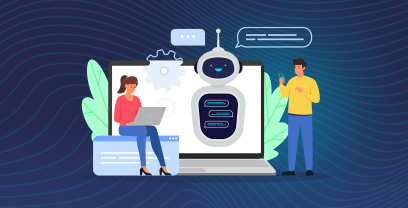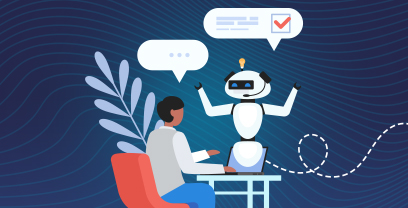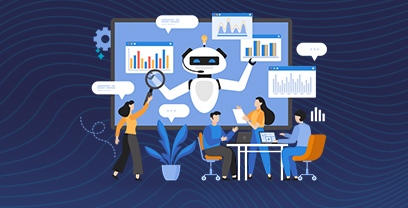AI procurement software is already reshaping how leading teams make decisions, reduce risk, and find new value. But how do you transform early pilots into enterprise-wide projects that make an impact?
Making artificial intelligence in procurement functional and beneficial requires more than just experimenting with models and algorithms. Successful implementation requires a careful look at how to integrate AI within existing systems and processes while staying ahead of risk, governance, and data readiness challenges.
In this article, we’ll dig into the practical steps for implementing AI procurement software, from data and system readiness to managing risk and scaling adoption. You’ll learn what it takes to move past the experimentation phase and start seeing tangible and sustainable results.
Key Takeaways
- AI procurement software is reshaping decision-making, offering intelligent sourcing solutions and faster processes.
- Strategic implementation of AI requires clean data, system integration, clear governance, and collaboration across procurement, IT, and finance teams.
- Platforms like Ivalua are embedding AI agents within source-to-pay processes to enable process autonomy to some extent and intelligent automation, without compromising transparency, human involvement, data security or compliance.
| Discover how Ivalua can help you harness the power of AI in procurement to drive smarter decisions and achieve better outcomes. Find Out More |
Where Does AI Fit in Your Procurement Tech Stack?
AI’s role in procurement is growing, but it’s not a cure-all. It’s important to understand where to deploy it first to create value without compromising trust or compliance.
Here are a few key areas in which AI is being implemented today by leading procurement teams:
- Sourcing and Supplier Management: AI can entirely automate RFX processes from end-to-end, depending on the level of autonomy an organization would want. Humans can be added to any or all key decision points – supplier selection, award, etc.
- Contract Analysis with AI: AI excels at parsing and analyzing large, unstructured data sets to uncover trends and spot anomalies. Being able to “Chat with your contracts” would have been impossible before, but not anymore. Further, AI agents can help during negotiations with recommendations on redlines and preferred clauses.
- Risk and Compliance Monitoring: AI can flag potential vulnerabilities with predictive capabilities and automate initial risk assessments and even draft improvement plans. Final decisions, however, still require human oversight to balance business priorities and regulatory needs.
- Transaction Automation: AI is well-suited for automating data entry and PO or invoice processing—especially for high-volume, low-value tasks. But edge cases and exceptions often require human intervention to maintain accuracy and compliance.
Understanding where AI delivers clear value and where human oversight is still essential can help your team focus its resources on areas where it will have the most impact, while avoiding unnecessary risk.
For a deeper look at how AI and Generative AI are supporting practical procurement workflows, check out Ivalua’s Generative AI Roadmap.
High-impact Use Cases of AI in Sourcing, P2P, CLM, and Spend Analysis
AI is already woven into procurement workflows, delivering measurable improvements in speed, accuracy, and decision-making. Let’s explore some of the most high-impact use cases for AI for procurement that teams are leveraging now.
Strategic Sourcing with AI
AI agents help procurement teams select existing or new suppliers, send out invitations to bid, quickly assess supplier proposals, compare to historic pricing and more. Intelligent bid evaluation saves time and ensures more consistent decision-making.
When integrated into digital sourcing solutions such as Ivalua’s Strategic Sourcing module, AI can also run sourcing events at a scale previously not possible. There would always have to be some tradeoff but with AI, there doesn’t have to be. With the improvement in automation, the autonomous capabilities and key human decision points, Ivalua lets sourcing team scale significantly.
Intake-to-Pay
AI streamlines Intake-to-Pay by guiding users and extracting all the relevant information based on their need, and then laying out the process for the user. Making the experience for the user simplified. For example, searching for an item that may need a spot bid and a purchase requisition created, is now simply done via a conversation. The process and all the elements are automatically created with the relevant people notified.
Guided buying features such as those found in Ivalua’s P2P suite use AI to suggest preferred suppliers and ensure compliance with purchasing policies, simplifying workflows and boosting efficiency.
AI for Contract Management
Contract lifecycle management is another area where AI is extremely useful. By automatically scanning contracts to extract metadata, detect critical clauses and tag risk-related terms, AI reduces review times and ensures contracts align with legal and compliance standards.
This level of intelligence can also be incorporated into the contract workflow to enable faster execution and better governance.
GenAI and LLMs: Where They Add Value
Generative AI and large language models (LLMs) offer powerful new capabilities for procurement teams. While they’re not fail-proof – hallucinations, bias, and legal concerns demand rigorous review – they can accelerate content creation, reduce manual effort, and surface insights faster.
Here are a few areas in which they’re already making a difference:
Drafting RFPs or Supplier Emails
GenAI procurement technology can quickly generate first drafts for RFP documents or supplier communications, streamlining repetitive writing tasks, and giving procurement professionals a head start. They can also be used to support consistent, professional outreach/communications during the vendor selection process, and even analyze submissions.
Summarizing Contractors or Supplier Profiles
LLMs can scan complex contracts and supplier records, pull out key metadata and highlight potential risks. This saves teams hours of reading and enables faster, better-informed decisions. AI can ask assist in redlining and negotiation.
Support Agents for Procurement Queries
AI-powered assistants can answer procurement-related questions and find information from internal documents instantly, helping teams to resolve routine questions quickly and get back to high-value work.
Download our IVA Generative AI datasheet to explore how Ivalua’s leverages GenAI to bring these scenarios to life.
Despite the breadth of AI’s capabilities for procurement software, human oversight is still essential. In the next section, we look at what humans can do that AI still can’t.
Which Workflows Still Need Human Oversight
Boundaries matter! AI can inform, accelerate, and support decisions, but the final call often requires a nuanced, human understanding of legal, ethical, and strategic considerations, especially in complex areas such as those outlined below.
Strategic Supplier Selection/Award
Choosing the right suppliers involves assessing their long-term fit, potential risk, and alignment with company values. AI can recommend and score proposals, but human judgment is essential for evaluating soft factors and forging strategic relationships.The key is to have the flexibility to drop a human in the loop wherever needed and transparency of AI decisions.
Final Contract Negotiation or Approval
AI can draft and analyze contract terms, and suggest redlines but final negotiation and sign-off for certain types of contracts will always require human insight to understand and balance legal risk, business priorities, and evolving market dynamics.
For more on how Ivalua’s IVA balances AI capabilities with human insight, download our IVA Generative AI datasheet.
Now that we’ve explored impact areas for AI and the need for human oversight, let’s get down to business: how do you successfully implement AI procurement software? In the sections that follow, we outline foundations for implementation along with governance considerations and how to measure success.
Foundations for Implementing AI Procurement Software at Scale
Using AI procurement software requires a strong foundation. The most advanced AI models can’t deliver the value in procurement if your data is fragmented and disconnected, or you can’t trust the results.
What needs to be in place before for AI to move from the pilot stage to enterprise-ready?
Data Infrastructure and System Integration Requirements
AI depends on clean, structured, and real-time data, and the output is only as good as the input. The data can’t just be available and accessible, it must be understandable by AI i.e., the data needs context. Unfortunately, procurement data is often scattered across ERP, supplier portals, legacy tools, and spreadsheets, making accurate AI-driven insights impossible.
Things such as a true golden supplier record and integration across source-to-pay and interconnectivity of data are key for trusted results, which is why many leading organizations are investing in unified platforms for all their procurement data with multi-ERP support.
Controlling AI Output with a Quality Feedback Loop
AI agent-generated outputs must go through a review and quality check process much like the work of a human often has to be reviewed. This feedback loop is essential to ensure the objective of the agent is being met in the intended manner.
CTA: For a practical guide to rolling out AI-ready processes and achieving full stakeholder alignment, download the Source-to-Pay (S2P) Implementation Guide.
How to Govern, Measure, and Scale AI Across Procurement
Implementing AI is just the beginning; long-term success means maintaining control, proving value, and expanding adoption across your procurement organization. Consider these important questions:
- Can this withstand an audit?
- Is it actually delivering measurable improvements?
- And how can we use these insights to transform other parts of the business?
Let’s explore the pillars for sustainable AI governance, performance tracking, and scaling across procurement.
Managing Risk, Bias, and Explainability
Reputational damage, compliance failures, and hidden bias are real risks when deploying AI procurement software. Poor or incomplete data can skew recommendations and create unfair or unreliable results, undermining procurement’s credibility.
Lack of explainability and auditability can also be damaging. Stakeholders need clear, traceable logic for AI-driven decisions, and legal and finance teams must trust these conclusions. To that end, procurement must be able to defend their AI-driven decisions under scrutiny.
For these reasons, audit trails and built-in support for governance is a critical feature of any procurement platform, to ensure that AI outputs are transparent, defensible, and reversible.
Tracking the Right KPIs and Avoiding False ROI
When implementing AI procurement software, tracking the right performance indicators is a must. Some key procurement KPIs include cost savings, cycle time reduction, compliance rates, and reduced supplier risk. Important to note that AI will allow procurement teams to do things they would not have previously. For instance a low value activity that can be massively scaled with AI.
Beware of “false ROI” – procurement workflows that seem faster but deliver lower-quality outcomes, or inflated savings numbers that don’t translate to real savings. Ivalua’s spend tracking and predictive analytics provide a solid foundation for measuring actual ROI instead of making optimistic projections.
Getting Buy-in for Scaling AI Beyond Pilot Stage
Many pilots stall because AI isn’t integrated into daily workflows or lacks clear ownership. Common barriers include:
- No process integration
- Poor change management
- Resistance from IT, legal, or finance
To move from pilot to production engage legal and finance early in the process. Define clear roles and responsibilities for procurement, IT, and AI vendors, and use pilot results to create a phased, achievable rollout plan. In the Agentic Era, the pilot is a precursor to the implementation.
Ivalua’s configurable workflows and native integration across procurement functions help build stakeholder trust and expand adoption at scale.
CTA: Learn what it takes to scale Generative AI in procurement. Download our Generative AI Roadmap.
Powering Procurement with Autonomous AI Agents
Autonomous agents powered by Generative AI are transforming procurement by automating 40-70% of tasks, from RFI/RFP generation to contract management, P2P activities and more. Ivalua is embedding these agents directly into its no-code platform, providing flexible, secure, and context-aware workflows that evolve with your business.
Key layers driving this transformation include:
- LLM: Next-generation Large Language Models have powerful reasoning capabilities in real time, moving beyond static outputs to deliver structured, logical insights. These models lay the foundation for dynamic AI-powered decision-making.
- Customer Application Layer: Ivalua’s AI agents manage real-world procurement tasks such as onboarding suppliers, managing quick bids, and navigating contract repositories. They dynamically generate contextual instructions, and turn disorganized data and processes into streamlined, automated experiences.
- AI Orchestration Layer: This is the engine that blends LLM reasoning with enterprise data and workflows to dynamically break down complex tasks into granular steps, then validate outputs for accuracy, consistency, and compliance. It provides LLM independence, so you can integrate your preferred AI models, adapting to your IT environment and long-term AI strategies.
The benefits are substantial:
- Real-time, high-quality insights: Agents provide instant, actionable intelligence for faster decision-making and proactive risk management.
- Increased productivity: By automating repetitive tasks such as intake management and supplier onboarding, procurement teams can focus on higher-value work.
- Executing on what was impossible before: Agents can unlock new value that was untouched by procurement before simply due to lack of resources. E.g., a human can run a limited number of spot bids but an AI agent can run hundreds, thousands in minutes.
- Greater consistency and accuracy: Dynamic AI orchestration ensures outputs align with procurement goals, policies, and compliance requirements.
- Seamless adoption: User-friendly interfaces, and voice-enabled and mobile-friendly experiences lower the barrier to adoption.
- Strategic alignment: Ivalua’s flexible, LLM-independent platform ensures AI investments align with broader IT and data strategies, future-proofing your procurement capabilities.
Already proven in supplier onboarding, intake management, and workforce management, these autonomous agents are setting a new standard, driving operational excellence.
Download our whitepaper, Powering Procurement Transformation with Autonomous AI Agents, to learn more about the benefits of Ivalua’s approach to AI in procurement.
Next we explore how AI agents operate and add value in procurement.
AI Agents Learn, Adapt, and Collaborate for Enhanced Strategic Decision-Making
By continuously monitoring context, recognizing patterns, and refining outputs over time, AI agents enable teams to make smarter, faster decisions. Instead of reacting to crises or relying on manual intervention, procurement can now anticipate risks, optimize supplier mix, and align sourcing strategies with broader business goals. This shift moves procurement from a tactical function to a proactive driver of competitive advantage.
AI Agents Fit Seamlessly into Existing Infrastructures
AI agents built into platforms like Ivalua don’t require disruptive rip-and-replace efforts. Instead, they operate within your existing technology ecosystem, leveraging APIs, traditional workflow as part of broader agentic workflows, event triggers, and embedded intelligence to integrate seamlessly with procurement, supplier management, and financial systems. This ensures quick deployment and rapid ROI, while allowing teams to keep using their familiar workflows and tools.
AI Agents Need Clean, Structured Data to Deliver on Their Promise
For AI agents to generate reliable recommendations and insights, they must have access to accurate, up-to-date data across sourcing, contracting and supplier management, as well as spend visibility. That’s why platforms like Ivalua, with its unified data models and real-time data-driven procurement flows, provide a critical foundation for autonomous agents. By consolidating these data points into a single, audit-ready source of truth, procurement teams can ensure that every AI-driven insight is rooted in accurate context.
Next, we share a case study, where an Ivalua client has experienced AI’s potential in practice.
Customer Story: How Körber Unified Global Procurement with Ivalua
Körber, an international technology group with over 10,000 employees and 100+ global locations, faced a fragmented procurement landscape. With five distinct business areas (Digital, Pharma, Supply Chain, Tissue, and Tobacco) spread across multiple ERP systems and diverse IT structures, aligning procurement software best practices was a challenge. Körber set out to simplify its IT infrastructure, unlock more value from suppliers, and drive greater efficiency by focusing on end-to-end collaboration and procurement automation tools.
Using Ivalua, Körber achieved a unified approach to procurement that accommodates each business area’s unique needs. The platform covers all sourcing activities for both direct procurement and indirect procurement, with built-in collaboration to bring suppliers and stakeholders together seamlessly. Most importantly, a unified data model delivers true 360-degree visibility into suppliers worldwide, supporting smarter decisions and more effective procurement across the entire enterprise.
“The Ivalua platform enables us to manage all major sourcing activities in one place, driving standardization and supplier data harmonization across our global businesses.”
– Michael Stietz SVP & Chief Procurement Officer, Körber
Read the full Korber case study.
Drive Tangible Value with AI in Procurement
AI procurement software initiatives are only as effective as the systems that support them. By ensuring clean data, scalable workflows, and cross-functional buy-in, companies like Körber and others are proving that AI can be a powerful enabler of procurement optimization.
Still, successful implementation and adoption of these tools require careful planning, stakeholder alignment, and a focus on measurable outcomes to truly unlock their potential – and choosing the right platform is the first critical step.
Discover how an AI-powered procurement platform like Ivalua can help you unlock opportunities to drive real, sustainable value with AI.
| Learn how Ivalua can help you streamline your procurement with AI-powered automation insights. Watch Demo / Find Out More |
FAQs about AI in Procurement
How is AI in procurement different from basic automation?
AI in procurement goes beyond predefined rules to analyze data, identify patterns, and make contextual decisions in real time. This enables smarter recommendations and risk mitigation in procurement, while basic automation focuses on repetitive tasks only.
Can AI help with supplier collaboration and not just efficiency?
Yes, AI can support real-time data sharing and highlight supplier performance trends, enhancing collaboration. It also helps to builds trust and alignment with your suppliers.
What if our data isn’t clean enough for AI?
Bad data limits AI’s effectiveness and can produce misleading insights. Investing in data cleanup and unifying disparate systems is critical to harnessing AI’s full potential.
How are AI agents different from traditional procurement bots?
Traditional bots follow static scripts, while AI agents dynamically adjust to context, evolving supplier conditions, and data flows. This makes AI agents more strategic, reliable, and responsive.
How should we evaluate AI features in procurement software?
Look for transparency, explainability, and integration with your existing workflows. Make sure the solution can deliver actionable insights, not just predictions.
Can AI agents operate across sourcing, contracting, and supplier performance?
Yes, advanced AI agents such as those in Ivalua’s platform work across the full procurement lifecycle. They connect sourcing, contracting, and supplier management, creating end-to-end visibility.
What makes AI in Ivalua different from other tools?
Ivalua’s AI agents are built into a unified, no-code platform that’s fully auditable and designed for complex enterprise needs. They’re also flexible, working with your preferred data and digital procurement strategy.
Further Reading
Datasheet:
IVA (Intelligent Virtual Assistant)
Whitepapers:
Powering Procurement Transformation with Autonomous AI Agents
Generative AI in Procurement: A Practical Guide to Building Your Roadmap
Webinar:
Enabling AI-Powered Procurement: Exploring the Now and the Next
Blog:
Next-Level Procurement: Embracing GenAI and Building Resilience for the Future
The Arrival of AI Agents in Procurement – Understanding the Basics
Implementing AI Agents in Procurement: Best Practices & Strategies




